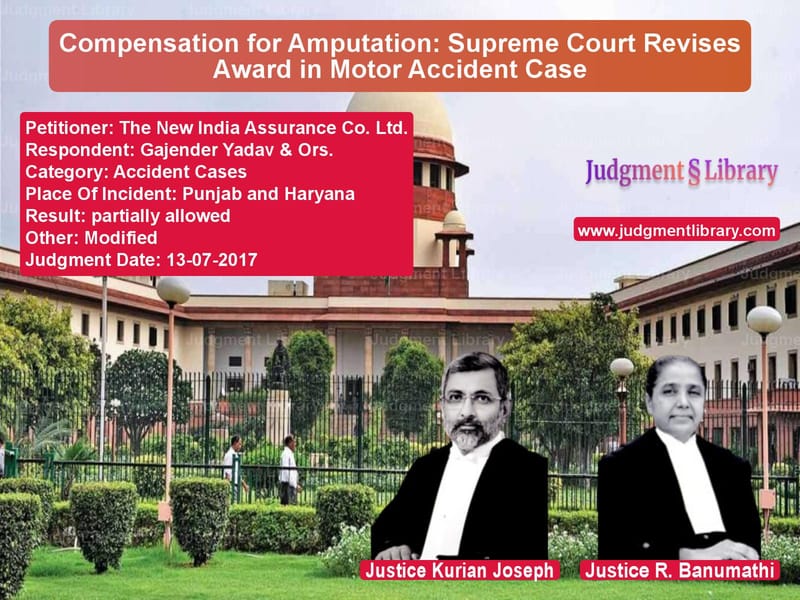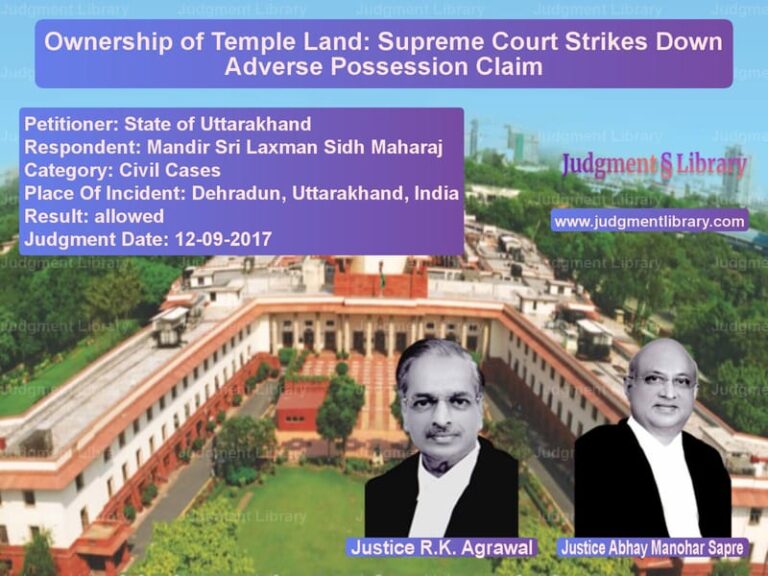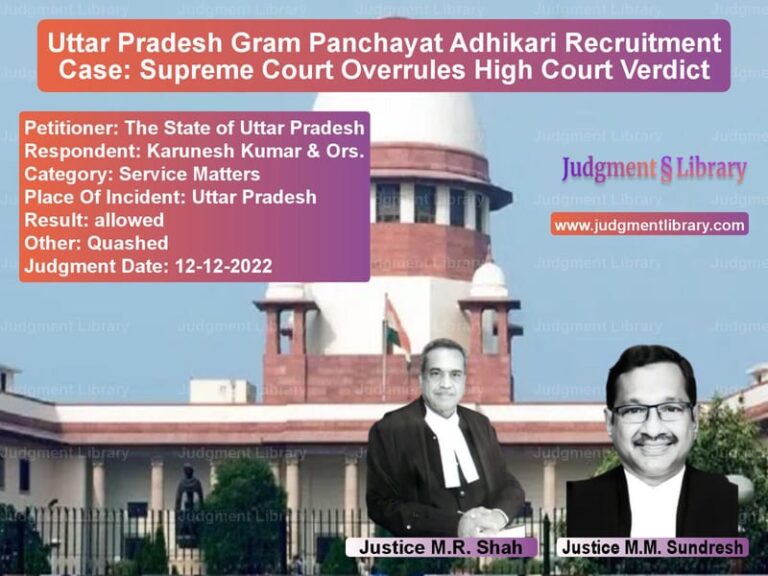Compensation for Amputation: Supreme Court Revises Award in Motor Accident Case
The case of The New India Assurance Co. Ltd. v. Gajender Yadav & Ors. pertains to the crucial issue of compensation for disability caused by a motor accident. The Supreme Court of India was called upon to decide the quantum of compensation for an individual who suffered an amputation below the knee due to an accident.
Background of the Case
On January 28, 2004, Gajender Yadav, the claimant, met with a severe accident resulting in the amputation of his left leg below the knee. At the time of the accident, he was employed as a Security Officer at Bennett & Coleman and was 37 years old. His role required significant mobility, but after the accident, his duties were reduced to a desk job, with no scope for career growth or promotions.
The claimant initially approached the Motor Accident Claims Tribunal (MACT), which awarded him Rs. 6,87,000 with 9% annual interest. Dissatisfied with the compensation, he appealed to the Punjab and Haryana High Court, which significantly increased the award to Rs. 27,14,835. The insurance company challenged this decision, while the claimant sought further enhancement, leading to the present appeal before the Supreme Court.
Key Issues Before the Court
- What should be the appropriate compensation for the claimant considering his amputation and permanent disability?
- Should the High Court’s enhancement be upheld, reduced, or further increased?
- How should future earnings and functional disability be assessed?
- Should the claimant be compensated separately for physical disability and future loss of earnings, or would this be a duplication?
- Is the claimant entitled to additional compensation for artificial limb replacement?
Arguments of the Petitioner (New India Assurance Co. Ltd.)
The insurance company, represented by legal counsel, argued that:
- The High Court’s award of Rs. 27,14,835 was excessive and needed reduction.
- The claimant was still employed and earning a salary, which should be factored into the compensation calculation.
- Compensating separately for physical disability and loss of future earnings was a case of duplication.
- The Tribunal’s original compensation of Rs. 6,87,000 was more reasonable.
Arguments of the Respondent (Gajender Yadav)
The claimant contended that:
- He suffered an 85% permanent disability concerning his left leg.
- Due to his amputation, he was no longer eligible for promotions at his workplace, severely affecting his career growth.
- His disability should be assessed in light of the precedent set in Raj Kumar v. Ajay Kumar & Anr. (2011) and Sandeep Khanuja v. Atul Dande (2017), where courts considered functional disability for computing compensation.
- Additional compensation should be awarded for the cost of artificial limb replacement at regular intervals.
Supreme Court’s Analysis and Judgment
The Supreme Court, comprising Kurian Joseph and R. Banumathi, carefully reviewed the facts and legal precedents and delivered the following findings:
Reduction in Compensation for Future Earnings
- The Court found that the High Court had erroneously awarded Rs. 8,00,000 for physical disability and Rs. 13,00,000 for future loss of earnings. This was deemed a duplication.
- Instead, the Court applied the multiplier method used in Sarla Verma v. Delhi Transport Corporation (2009) and Raj Kumar v. Ajay Kumar (2011) to recalculate the future earnings.
- The claimant’s pre-accident salary was Rs. 14,000 per month, and with an addition for future prospects, it was adjusted to Rs. 21,000 per month.
- Given the 85% disability in the left leg and his restricted career growth, the Court determined a functional disability factor of 40%.
- Applying a multiplier of 15 (as per the claimant’s age of 37), the Court awarded Rs. 15,12,000 towards future earnings.
Compensation for Artificial Limb Replacement
- The Court acknowledged that the claimant would require artificial limb replacements periodically.
- It awarded an additional Rs. 2,00,000 for the cost of replacing artificial limbs.
Final Compensation Award
After adjusting for the duplication and adding compensation for artificial limb replacement, the Supreme Court awarded a total of Rs. 23,26,835, broken down as follows:
| Compensation Head | Amount (Rs.) |
|---|---|
| Medical expenses and hospitalization | 1,14,835 |
| Attendant, special diet, and conveyance | 50,000 |
| Physiotherapy and artificial limb implant | 1,00,000 |
| Future loss of earnings (Revised) | 15,12,000 |
| Physical pain, mental agony | 50,000 |
| Loss of pleasure and longevity | 1,00,000 |
| Loss of beauty | 50,000 |
| Artificial limb replacement | 2,00,000 |
| Total | 23,26,835 |
Interest Rate and Final Order
- The Court ordered that the claimant be paid interest at 8% per annum from the date of the claim petition.
- With this revised compensation structure, the appeals were disposed of with no further costs imposed on either party.
Conclusion
The Supreme Court’s decision in this case establishes a balanced approach to compensation for disabilities arising from motor accidents. While ensuring that the claimant receives fair compensation for his loss of earnings and medical needs, the Court also removed excessive awards to prevent duplication.
This judgment reinforces the importance of using the multiplier method for calculating future earnings and highlights the necessity of considering functional disability when awarding compensation in similar cases.
Don’t miss out on the full details! Download the complete judgment in PDF format below and gain valuable insights instantly!
Download Judgment: The New India Assura vs Gajender Yadav & Ors Supreme Court of India Judgment Dated 13-07-2017.pdf
Direct Downlaod Judgment: Direct downlaod this Judgment
See all petitions in Compensation Disputes
See all petitions in Motor Vehicle Act
See all petitions in Negligence Claims
See all petitions in Judgment by Kurian Joseph
See all petitions in Judgment by R. Banumathi
See all petitions in partially allowed
See all petitions in Modified
See all petitions in supreme court of India judgments July 2017
See all petitions in 2017 judgments
See all posts in Accident Cases Category
See all allowed petitions in Accident Cases Category
See all Dismissed petitions in Accident Cases Category
See all partially allowed petitions in Accident Cases Category







